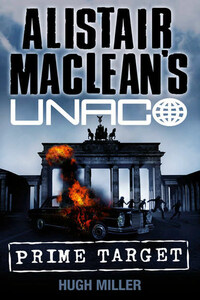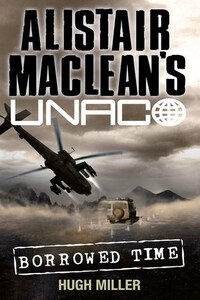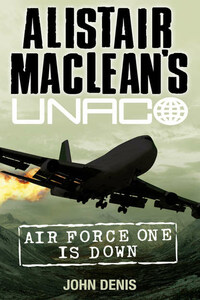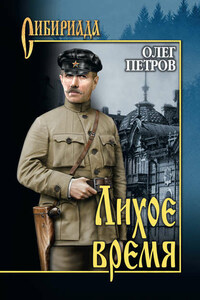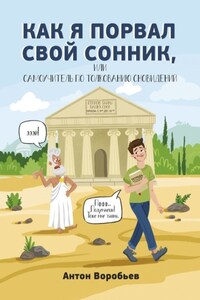Berlin, 24 April 1945
General Albers ran up the last few steps from the bunker to ground level and had to stand for a moment at the top, catching his breath. It was his habit to do everything at the double, but a spinal injury and chronic emphysema made that kind of behaviour unwise nowadays.
‘One moment,’ he panted, ‘I’ll take a look…’
He pushed aside a camouflage screen of metal and splintered planks and peered outside, craning his thin neck. All he could see in the immediate area was rubble and a scatter of uprooted shrubs.
‘All clear,’ he said, turning back to the stairs and holding out his hand.
Hitler declined to take it. He braced himself against the side of the stairwell and climbed into the open without help. The young soldier assigned to guard him came clattering up behind, clutching his sub-machine-gun.
‘Please wait, Führer,’ Albers said.
He crossed the rubble-strewn garden, smelling cordite and the damp sourness of the earth. A large hole had appeared near the gateway to the street. He detoured around it, turning up the collar of his greatcoat against the rain. He strode out into the middle of the road and stopped, looking both ways. Twenty metres to his left an officer of the Leibstandarte, nearly invisible in his black SS uniform, raised his arm to attract the general’s attention. Albers waved back and glanced over his shoulder at the Chancellery.
For a moment he was transfixed, shocked by the level of damage. This was his first time out of the Führerbunker in three days. When he had gone in by the stairs where Hitler and his guard now waited, the back of the Chancellery had been intact. Now, caught by the sideward impact of Soviet artillery closing on the rail junction at Spandau, huge stretches of stonework had been gouged out. Interior support walls had split and the second and third storeys had collapsed on to the crossbeams of the ground floor.
Albers started back the way he had come and felt a sudden pressure on his ears. The ground shook and there was a salvo of heavy gunfire to the west. He dropped to his knees as a pediment on the Chancellery roof flew apart with a loud crack and hurtled down in a shower of fragmented black marble. He crouched and put his hands over his head, feeling shards strike his back and arms.
He stood up again and saw the SS officer leading a string of young boys from a burned-out government building across the road. Over at the Chancellery Joseph Goebbels had come up the steps from the bunker. He spoke for a moment to the Führer, then came limping across the garden.
‘Are they ready?’ he asked Albers.
‘They are being brought now, Minister.’ Albers pointed to the straggle of children lining up by the wall on the other side of the road. ‘We couldn’t get proper uniforms, but in the circumstances I don’t think they look too bad.’
The boys wore identical black jerkins, buttoned to the neck, and black forage caps. The youngest, who was eight, was frightened by the gunfire and had begun to cry. He was being comforted by the oldest in the group, a lad of fourteen.
‘I’ll speak to them and prepare them,’ Goebbels said. ‘I will take two minutes, then I’ll come for the Führer.’
Albers went back to the stairs, brushing at his coat sleeves, noticing that black marble-dust mingled with rain resembled smears of oil. He looked at the soldier beside the Führer and saw how scared he was. Everyone had been against holding this ceremony outside. Hitler had been warned it was suicidal, but he had insisted. An induction as important as this had to be performed in the open air under German skies. Even if the skies were black with the smoke of a dying Berlin.
‘The Minister is addressing the boys, Führer.’
Hitler nodded and appeared to shiver. He looked weak, Albers observed, and incredibly old. Four days ago he had turned fifty-six, but today he looked nearer seventy. He was stooped and weary, one side of his body in a perpetual tremor, his light-starved skin the colour of putty. Earlier in the day he had been taken ill and could not stop vomiting. His valet, Heinz Linge, summoned the doctor who administered the usual, an intravenous narcotic that drained the residue of colour from the Führer’s face and put a very unnatural glint in his eyes. But afterwards he was no longer so desperately sick, he didn’t shake so obviously, and he had even managed to display a little pleasure at the prospect of this ceremony.
Goebbels had finished talking. He came hobbling across the broken ground, smiling cautiously as he always did.
‘Everything is ready, Führer.’
‘Good, good.’ Hitler rubbed one blue-fingered hand on the back of the other, an attempt at vigour. ‘So we have thirty boys, yes?’
‘That is correct.’ Goebbels fished a sheet of paper from his coat pocket and unfolded it. ‘I have prepared a summary of the arrangements which have been made for them, if you would care to read it. Everything is precisely as we planned, of course…’
